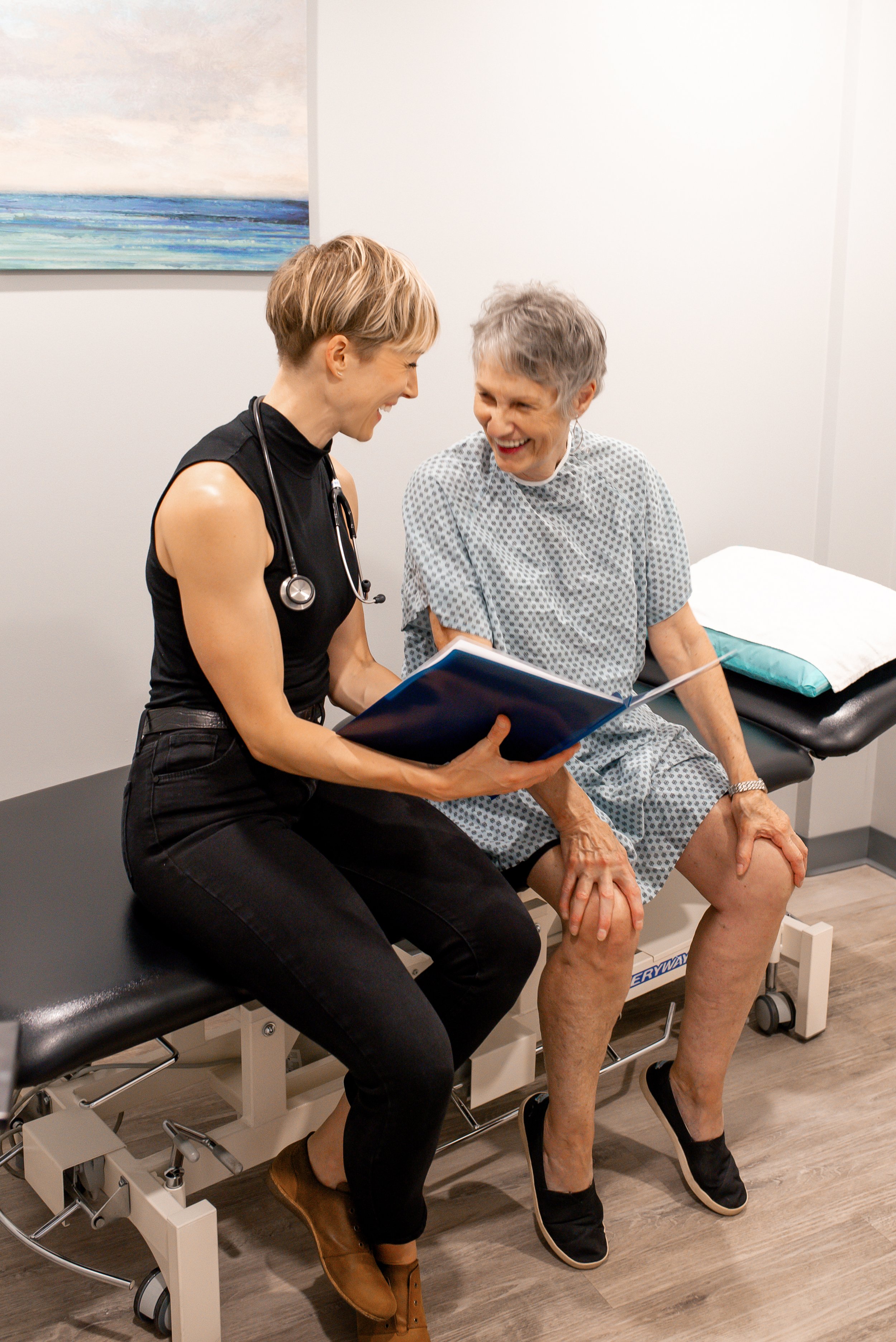Returning to Work After Cancer, Your Top Questions Answered.
Experience Preparedness
Discussions around returning to work can be encouraging but also overwhelming. Often, a cancer journey is spent focusing on treatment. This can result in rehabilitation being put aside to the very end. Once the tidal wave of treatment is over, you may be left with undiagnosed treatment side-effects. Perhaps you’re feeling de-conditioned and a bit confused about how to approach returning to work, the last step in our 5 phases of cancer rehab. In this blog, we will look at common questions about returning to work after cancer. Together, let’s help you understand your options.
When is a good time to return to work?
A cancer journey is very different from person to person; hence the symptom burden varies tremendously. As rehab and treatment are best when personalized, returning to work should also include a personalized plan. Some patients may have few limitations and feel ready for a full return, while others may benefit from a more graded approach such as a gradual return to work plan.
Your symptom burden may remain undiagnosed and it can heavily determine your physical and mental capacity for return to work. Together we can assess your baseline function, balance, range of motion, strength, aerobic and neurovascular systems. At times we will need to assess for any treatable cancer related conditions that you may have such as neuropathies etc.
Cancer rehab support can allow for any treatment related conditions to be diagnosed and accounted for in your return-to-work plan. It’s encouraging to know that a great majority of cancer survivors do return to work one year after diagnosis, and remain there for 7 or so years later unless they retire (Feuerstein, 2009), yet so the return to work needs to be personalized.
Do I have to return to work full-time? How do I know if I am ready to return to work?
Some patients have little side effects remaining from cancer and feel ready for a full return to work. Others may feel like they need some support to to even think about getting started. Many employers and extended health plans support a gradual return to work (GRTW) plan. This means you would return part time and perhaps with partial duties. Reach out to your employer and insurance providers to find out if this is an option for you.
If a medical report or a functional evaluation of work capacity is needed to create the GRTW plan, seeing a cancer physiotherapist can offer the support needed. Together we can complete the needed evaluations and create a GRTW plan to share with your case manager and employer.
Knowing if you’re ready to return to work is a full question. Firstly if you’re even thinking about it, that’s a great sign! This means you have mental stamina to go beyond just managing appointments and all the treatment. After after patients have completed the treatment phase, there may space to start thinking about returning to work.
Preparedness matters, start early with a cancer rehab initial assessment, even if only to discuss your return to work options. In addition we will comprehensively assess your function, allowing both of us to understand where rehab support may still be of need.
Consider a Gradual Return to Work
What is a gradual return to work plan (GRTW)?
Returning to work may seem like a daunting task but can be made more feasible with a graded approach. Even with little symptom burden, returning to work may involve a steep adjustment. Your physical and mental health best adapt with a gradual increase of demands. A GRTW plan can include modifications to your hours, schedule, and duties. Many extended health insurance companies and employers support GRTW plans.
A GRTW may include shorter hours at work or spaced-out work weeks to start, allowing for pacing. Modifications to your work duties may also be of benefit to you. This can allow for simpler and less demanding tasks to be prioritized first. More significant areas of responsibility can be added over time.
What services do you offer to support a return to work?
We offer support before and during your return to work. We offer cancer rehab services to evaluate your capacity relating to your work demands. If you are thinking of returning to work, we offer the following:
Return to work and capacity evaluations (work demand simulation)
Cancer rehab initial assessments for new patients (a comprehensive examination of your function, balance, range of motion, strength, aerobic and neurovascular systems)
Return to work and gradual return to work (GRTW) reports for Canada Life, Sunlife, Pacific Blue Cross and other extended health care providers
We work directly with your case manager and employer as needed.
Family physician liaising
Once we have diagnosed any cancer related conditions that you may have, we can then create the right gradual return to work plan for you. This personalized plan can be the difference between success and feeling failure.
Through a return-to-work evaluation we can create a GRTW plan that includes:
Modified duties
Modified hours
Modified scheduling
Often a slower ramp up of hours and days can help build stamina and allow you to adapt. Triaging duties into varying categories of difficulty can help us prioritize the most attainable duties. This can allow you to reach smaller work-related goals first, and increase duties gradually. Small bites first if you will, as a cancer journey is nothing to take lightly. Together, we can best prepare you for a successful return to work, connecting along the entire GRTW plan.
What medical reports may be needed for a return to work?
Together, at the cancer physio we can collaborate with you to complete the needed medical reports and functional evaluations necessary for a supported return to work. At times, we have found that patients are not aware of their cancer related conditions such as fatigue or weakness. Being keen to return to work is a good step but often patients benefit immensely from a return-to-work evaluation that makes for a safe and successful return to work.
Medical Reports We Provide:
Service Canada ISP-2529 CPP Disability Benefit
Return to work functional assessments for extended medical providers and employers.
GRTW plans for employers, case managers and physicians
What if I am not able to return to work? How do I qualify for long term disability?
In some cases, a cancer journey may have significant symptom burden, creating many long term physical, and mental barriers. At times, patients try to return to work and have difficulty doing so, only to then learn that the cancer related conditions are too burdening. Therefore, some patients would like to not return to work for 6 months or more and may qualify for long term disability.
In the above scenario, you may qualify for long term disability from your health insurance provider, employer, or service Canada CPP. As an example, Service Canada may offer a long-term disability benefit that you can apply for online. They will also request a medical report for Canadian Pension Plan Disability Benefit (ISP-2519) form, with which we can complete together.
If you are concerned about your inability to return to work, we suggest that you start cancer rehab. We will spend an hour one on one completing baseline assessments (orthopaedic, function, balance, cardiovascular and neurological) assuring that your physical disabilities are comprehensively documented.
Physiotherapists are primary care clinicians which means we can diagnose your limitations. This is to your benefit when trying to advocate for disability status and obtain medical documentation. For example, ‘feeling severely tired’ or ‘having severe dizzy spells’ may be a diagnosable condition such as cancer related fatigue or a vestibular neuropathy. We can then advocate for you when appropriate. A cancer journey can leave you with limiting conditions such as but limited to:
How do I know if I’m emotionally and mentally prepared to go back to work?
After any loss or life changing event, there is a period of grieving and adjustment. Sometimes the space to process the cancer journey only starts after all the treatments slow down. While at work, others may ask about your cancer experience to express care. How much you decide to talk about it is entirely up to you.
Use strategies to best manage your emotional health when returning to work
Better manage the conversations about cancer by planning ahead of time. It is good to have some statements prepared ahead of time to better manage conversations that you don’t want to have. For example, “thank you for asking but I am finding myself wanting to focus forward from here on out” or “I really appreciate your concern but to best manage my energy I’d like to focus on my work tasks today”.
Accept help. Perhaps you have opted for a GRTW and your duties are less, or perhaps you have co-workers supporting you in some simple ways. Help can come in many forms, such as counselling, support groups, psychologists or family, assure you’re accepting the support that is available to you.
Know your rights. You have a right to not be discriminated against for your cancer, there are national laws that protect your rights as a worker/employee. More legal support, resources are provided through the cancer legal resource center .
Further Resources
“Cancer and Work: A Canadian Perspective”
An academic review exploring the 7 domains of returning to work. (statistics, function, positive factors, barriers, interventions, policies and recommendations).
A return to work framework used by clinician’s and here at The Cancer Physio.
Support with preparing for a job interview, know what you need to disclose and what you don’t in terms of your cancer history.
BC Cancer Agency resources on planning for a Return to Work
I hope this blog has helped you feel supported through your consideration of returning to work.
Thank you for your interest in science and rehab,
Kindly, The Cancer Physio
Work Cited List
Feuerstein, M. (Ed.), (2009). Work and cancer survivors. New York, NY: Springer Science.








